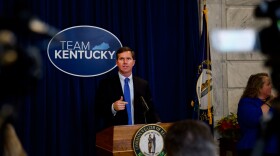The sharp increase of COVID-19 cases in Louisville over the past six weeks has forced the city’s health department to limit active contact tracing.
Louisville’s Metro Department of Health and Wellness tops out its contact tracing capacity at 25 cases per hundred-thousand individuals. Louisville is now at nearly 63 cases per hundred-thousand individuals.
There were nearly 3,400 new cases from Nov. 8 through the 14th, according to the latest data from the city’s health department. The week prior, there were about 2,300 new cases.
Chief health strategist Dr. Sarah Moyer said, in the last six weeks, cases have grown 250% — and hospitalizations are up more than 500%.
“There's uncontrolled spread of the virus despite measures that we have in place, and capacity is stretched thin across all aspects of healthcare, which limits our ability to protect and aid people,” she said during a briefing with other city and health officials Tuesday morning.
Moyer said once Louisville surpassed 25 cases per hundred thousand people, the health department reached capacity and could no longer pursue the “box it in” strategy it used all summer.
The high rate of cases has made timely contact tracing very difficult, said Bill Altman, a consultant leading Louisville’s COVID testing efforts.
“One of the things that we've done is that we’ve begun handing out information at the testing sites, and our partners are doing this as well, to give you a phone number (for you to) reach out to the contact tracers when you get a positive test result.”
Altman said people who test positive should not wait for contact tracers to reach out to them first. Instead, they should call (502) 912-8598 for guidance.
Kathy Turner, a spokesperson for Louisville’s public health department, said that the city continues to employ 295 contact tracers who work seven days a week. She said at this stage, they are typically only able to contact people with new positive test results, due to the sheer number of new cases. Whereas in the past, contact tracers would reach out to those who had been in close physical contact with COVID-positive patients, now those patients are being asked to reach those contacts themselves.
Representatives from three Louisville hospital systems — Baptist Health, Norton Healthcare and UofL Health — also spoke at the briefing. They said health providers are better at managing COVID-19 patients now than they were in the spring, which is helping the hospital systems manage the available resources at their facilities.
Dr. Jason Smith, chief medical officer at UofL Health, said coordination between the hospital systems could put the city in the position of not needing more extreme measures, such as a nearby field hospital.
Plus, he said, hospitals have employees and resources such as oxygen and food service already set up.
“Never, say never,” Smith said, acknowledging there could be a need down the road.
Dr. Steve Hester, the chief medical officer of Norton Healthcare, said a field hospital would be “an absolute last resort.”
He said he would be concerned about deploying hospital systems’ existing medical personnel to set up a field hospital.
“They're probably better deployed within our own healthcare system within the footprints of the hospitals we have caring for those patients, and we're going to do everything we can to make sure as these three health care systems that we don't need that hospital,” he said.
This story has been changed to clarify that Louisville is reducing the amount of active tracing it is doing and is asking people with positive tests to reach out to their contacts.






